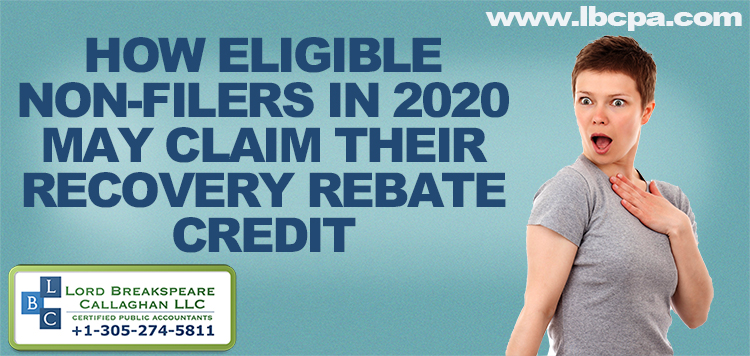LBCPA News 
Click here to go back
Time is Running Out: IRS Encourages Eligible Non-Filers in 2020 to Claim their Recovery Rebate Credit before May 17 Deadline

The Internal Revenue Service reminds those who may be entitled to the COVID-era Recovery Rebate Credit in 2020 that time is running out to file a tax return and claim their money.
Most taxpayers eligible for Economic Impact Payments linked to the coronavirus tax relief have already received or claimed their payments via the Recovery Rebate Credit. But for those who haven’t yet filed a tax return for 2020, the legal deadline is May 17, 2024.
The Recovery Rebate Credit is a refundable credit for individuals who did not receive one or more Economic Impact Payments, also known as stimulus payments, distributed in 2020 and 2021. Eligible taxpayers must file a tax return first to claim a Recovery Rebate Credit, even if their income from a job, business or other source was minimal or non-existent.
For individuals wanting to claim the 2021 Recovery Rebate Credit, they have until April 15, 2025, to file the required tax return.
Taxpayers owed a refund have three years after the filing due date to file and claim any money entitled to them. For 2020 tax returns, this year’s May 17 due date is three years after the original May 17, 2021, tax deadline.
The IRS also reminds other people who haven’t filed a tax return for 2020 to check their records; it’s possible they may be overlooking a potential tax refund that will no longer be available after May 17. The IRS plans to provide more detailed state-by-state information later this month for taxpayers who may have overlooked filing and getting a refund for 2020. These taxpayers will also face a May 17 deadline to file.
Who’s eligible?
Eligibility for the 2020 and 2021 Recovery Rebate Credit generally requires being a U.S. citizen or U.S. resident alien in the respective year, not being a dependent of another taxpayer and having a Social Security number issued before the tax return's due date.
Additionally, the 2020 Recovery Rebate Credit can be claimed for someone who passed away in 2020 or later.
Free help is available
Qualified taxpayers can also access free tax preparation assistance through the Volunteer Income Tax Assistance and the Tax Counseling for the Elderly programs. This is an ongoing effort by the IRS to encourage individuals who are not typically required to file tax returns to explore the potential benefits under the tax law. Use the VITA Locator Tool or call 800-906-9887 to locate the nearest VITA site.
The IRS also reassures taxpayers there is no penalty for claiming a refund on a late-filed tax return. Direct deposit is recommended as the quickest and simplest way to receive a tax refund.
Individuals with an IRS Online Account can check to see if they received any Economic Impact Payments, along with the total amounts.
Any Recovery Rebate Credit received does not count as income when determining eligibility for federal benefits such as Supplemental Security Income (SSI), Supplemental Nutrition Assistance Program (SNAP), Temporary Assistance for Needy Families (TANF) and the Special Supplemental Nutrition Program for Women, Infants, and Children (WIC). Claiming the credit does not affect an individual's immigration status or their ability to secure a green card or immigration benefits.
High-income non-filers: IRS compliance letters coming
The IRS also announced Feb. 29 a new effort focused on high-income taxpayers who have failed to file federal income tax returns in more than 125,000 instances since 2017.
The new initiative, made possible by Inflation Reduction Act funding, began with IRS compliance letters going out last week on more than 125,000 cases where tax returns haven’t been filed since 2017. The mailings include more than 25,000 to those with more than $1 million in income, and over 100,000 to people with incomes between $400,000 and $1 million between tax years 2017 and 2021.
If you have any questions regarding Essential Business Accounting, Domestic Taxation, International Taxation, IRS Representation, U.S. Tax Implications of Real Estate Transactions or Financial Statements, please give us a call at +1-305-274-5811
Source : IRS






